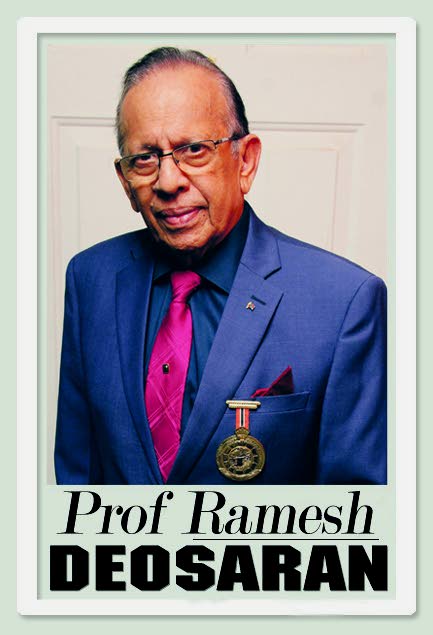Challenging party leaders

It’s really nothing new – party implosion and rebellion against the leadership.
It comes in different ways, for different reasons and ends in different ways.
Dr Eric Williams faced it from Karl Hudson-Phillips and ANR Robinson; ANR Robinson from Basdeo Panday; Patrick Manning from Dr Keith Rowley; Panday from three senior ministers; and now Kamla Persad-Bissessar from five frontline MPs.
While there is a big story behind each one, I remain intrigued by the circumstances around Hudson-Phillips’ challenge and the way he tried to craft successorship.
That was in the 70s, with Williams and the PNM still recovering from the threatening Black Power marches. In fact, seeking to neutralise the unsettling threat, Williams declared he was “Black Power” too.
Hudson-Phillips, as Attorney General, proposed a Public Order Bill which aroused extensive controversy.
While a lot has been written about this period, we seem to have learnt little or nothing from it. So we keep on recycling. Constitution reform yes, but political-party reform too. Parties must also have credibility and integrity.
During the 70s, Hudson-Phillips, encouraged by a small group of believers, envisioned succeeding Williams. But when, and how quickly could this be strategically manoeuvred? Open contest, or until Williams’ voluntary departure or death? Openly challenging a party leader is close to political suicide, sooner or later. Hudson-Phillips knew this.
Williams told his party and the country in September 1973 he was leaving office. That was front-page news. And voices, quiet and loud, turned to Hudson-Phillips. Rumours spread, especially through Patrick Chookolingo’s popular weekly, the Bomb. Hudson-Phillips smartly allowed the rumours to float without exposing any threatening ambition.
However, before that, in August 1973 I had the journalistic pleasure of an exclusive, lengthy, interview with him at Toronto’s Hyatt Regency Hotel.
As a University of Toronto student, I worked while studying. For many years, I was, quite enjoyably, the Express’s Canadian correspondent. I contacted Hudson-Phillips because I wanted to know what his PNM plans were. So did the entire country.
He was on his way to the Ivory Coast for a law conference, so to help save time we shared a breakfast interview.
Express editor, the ever-smiling David Renwick, splashed the by-lined interview on August 13, 1973 across the paper’s front page. It was smartly headlined “AG: I am not out out to challenge Dr Williams.”
You see, as Hudson-Phillips quietly explained, it would appear in 1973 as a “disloyal, overly-ambitious move” to threaten Williams then. He preferred, it seemed, to bide his time.
A particular incident, however, helped inspire Hudson-Phillips into a reflective, cautious mood. Soon after Williams announced his wish to leave office, a delegation from the Inter-Religious Organisation, headed by Dr Wahid Ali, visited him, pleading for him to stay in office. And, so, after some letters to the editor, etc, Williams resumed office. That aside, it has become a clever political tactic when a party leader gives a public hint of giving up or not returning to office.
Anyhow, before leaving for the Ivory Coast, the stylish, articulate and very self-confident Hudson-Phillips had put up his name for election as the party’s chairman at the party’s 1973 convention. He had criticised the party for too much “smugness and complacency” and was attempting to replace Williams’ favourite, senator Francis Prevatt, as PNM chairman.
In the published Toronto interview, Hudson-Phillips said his plan was “to reactivate and motivate the internal structure of the PNM and to change the chairman’s role from being low-key to one that helps create a strong base.”
He added: “No one in the PNM should try to challenge Dr Williams’ leadership.” Well, that might have closed the issue inside the PNM, but, as we all know, Hudson-Phillips’ political dream still remained alive. Towards the end of the published interview, he made two fire-cracker statements. He said the PNM "isn’t a sufficiently representative cross-section of the population. There seems to be some resistance on part of Indians to joining the party. The upsurge of black nationalism in the country, as typified by the 1970 affair, has tended to put Indians off.”
And then this: “The PNM’s Women’s League lacked any large number of Indian women. As far as Indian women are concerned, their role in society has appeared to be a more passive one.”
Tactfully praising Williams for being “the most democratic of all in the Caribbean,” Hudson-Phillips blasted the then Opposition: “The opposition leaders are not men of calibre, they tend to have no belly. I welcome a strong opposition but politics is the art of maintaining power and no political party is going to help create an opposition against itself.”
Hudson-Phillips left the PNM soon after and formed his own party.

Comments
"Challenging party leaders"